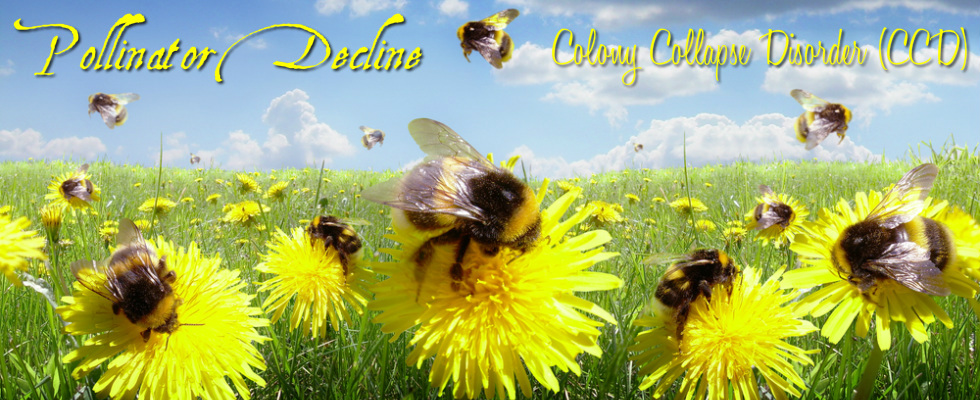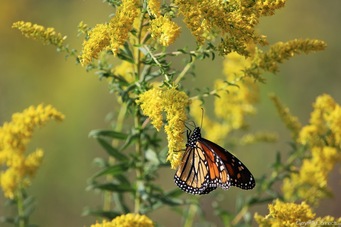
Pollinator Decline
Pollinators, such as bees, butterflies, bats, moths, hoverflies, hummingbirds and even beetles, ensure cross pollination and genetic diversity for plants by
moving pollen from the male anthers of a flower to the female stigma of a flower to accomplish fertilization, thereby participating in the sexual reproduction of many plants and resulting in the
pollination of 90% of flowering plants. Although many people may think of bees as a nuisance, they are among the most important pollinators of wild plants and agricultural crops around the world, provide enormous benefits for humanity and are vital for agriculture, yet since the
last few decades of the 20th century, they are in major decline
, largely due to the
increased use of pesticides, changing and shrinking habitats and new diseases
(see also). Bee populations have been dropping
29%-36% every year since 2006
and according to the
most comprehensive national census of the insects
to date, the abundance of four common species of bumblebee in the U.S. has dropped by 96% in just the past few decades. As
Honey Bee Haven
states, "U.S. commercial beekeepers report that their industry is on the verge of collapse, and farmers who rely on pollination services are increasingly concerned. In addition to their agricultural value as pollinators, honey bees are a keystone, indicator species. Their decline points to (and will likely accelerate) broader environmental degradation in a kind of ripple effect. Honey bees are sounding an alarm that we ignore at our peril." According to the
Food and Agriculture Organisation of the United Nations (FAO), "Out of some 100 crop species which provide 90% of food worldwide, 71 of these are bee-pollinated. In Europe alone, 84% of the 264 crop species are animal-pollinated and 4,000 vegetable varieties exist thanks to pollination by bees. The production value of one tonne of pollinator-dependent crop is approximately five times higher than one of those crop categories that do not depend on insects." Bees are responsible for
pollinating your favorite fruits and vegetables, including apples, avocados, almonds, blueberries, stawberries, broccoli, carrots, cucumbers, watermelons, pumpkins and much more, and
pollinators are a key component of global biodiversity, providing vital ecosystem services to crops and wild plants. There is clear evidence of recent declines in both wild and domesticated pollinators, and parallel declines in the plants and animals that rely upon them. With the vanishing of
nearly one-third of all honey bee colonies in the US
, the time to
act and save pollinators
is now.
Learn more.
"The way humanity manages or mismanages its nature-based assets, including pollinators, will in part define our collective future in the 21st century. The fact is that of the 100 crop species that provide 90% of the world's food, over 70 are pollinated by bees. Human beings have fabricated the illusion that in the 21st century they have the technological prowess to be independent of nature. Bees underline the reality that we are more, not less, dependent on nature's services in a world of close to seven billion people." ~ Achim Steiner, UN Under-Secretary-General and UNEP Executive Director
The economic value of a single wild bee serving as a pollinator of blueberry is
estimated at $20
and the collective worth of bees and other pollinators is estimated to be
worth around $200 billion a year to the global economy.
"Agriculture is a major industry in the United States with a direct connection to one in every twelve jobs. Since the early twentieth century, ‘migratory’ beekeepers have provided a critical service to U.S. agriculture by moving their hives seasonally to pollinate a wide variety of crops. Commercial beekeeping adds between $15 and $20 billion in economic value to agriculture each year. Without the yield increases made possible by commercial pollination services, food prices would rise, our farm sector rapidly become less competitive globally, and the security and variety of our food supply would diminish. Honey bees are the most economically valuable pollinator worldwide, and many high-value crops such as almonds and broccoli are entirely reliant upon pollination services by commercial beekeepers. Globally, 9.5% of the total economic value of agricultural production for human consumption comes from insect pollination – in 2005, this amounted to just under $200 billion." ~ Beyond Pesticides: Economic Value of Commercial Beekeeping
Pesticides have been strongly linked to the major decline in honey bee populations of around a 50% drop over the last 25 years in the US and UK by seriously damaging bees renowned ability to navigate home. Scientists discovered that bees consuming just one pesticide suffered an 85% loss in the number of queens their nest produced, while another study showed a doubling in the disappearance of bees that failed to return home from food foraging trips. Considering the many benefits bees provide, such as pollinating a third of the food we eat, these losses pose a serious threat to food supplies. Ecologist: Pesticides linked to honeybee decline







